词性转换
英语单词词性转换
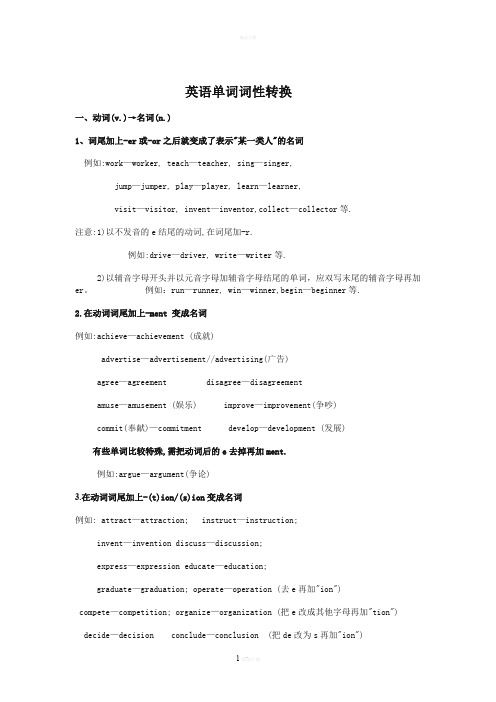
英语单词词性转换一、动词(v.)→名词(n.)1、词尾加上-er或-or之后就变成了表示"某一类人"的名词例如:work—worker, teach—teacher, sing—singer,jump—jumper, play—player, learn—learner,visit—visitor, invent—inventor,collect—collector等.注意:1)以不发音的e结尾的动词,在词尾加-r.例如:drive—driver, write—writer等.2)以辅音字母开头并以元音字母加辅音字母结尾的单词,应双写末尾的辅音字母再加er。
例如:run—runner, win—winner,begin—beginner等.2.在动词词尾加上-ment 变成名词例如:achieve—achievement (成就)advertise—advertisement//advertising(广告)agree—agreement disagree—disagreementamuse—amusement (娱乐) improve—improvement(争吵)commit(奉献)—commitment develop—development (发展)有些单词比较特殊,需把动词后的e去掉再加ment.例如:argue—argument(争论)3.在动词词尾加上-(t)ion/(s)ion变成名词例如: attract—attraction; instruct—instruction;invent—invention discuss—discussion;express—expression educate—education;graduate—graduation; operate—operation (去e再加"ion")compete—competition; organize—organization (把e改成其他字母再加"tion")decide—decision conclude—conclusion (把de改为s再加"ion")describe—description描写,描绘 (这是特例,不规则变化)4.在动词词尾加上-ance变成名词例如: appear—appearance (外貌;出现)perform—performance (演出)accept—acceptance (接受)resist-resistance n.抵抗,阻力5.在动词词尾加-ing变成名词 (方法与动词变为现在分词的方法相同)例如:meet—meeting build—building wait—waitingbathe—bathing say—saying(谚语) mean—meaning注意:以辅音字母开头并以元音字母加辅音字母结尾的单词,应双写末尾的辅音字母再加-ing如:swim—swimming shop—shopping begin—beginning二、动词(v.)→形容词(adj.)1.动词后面加able,以e结尾的动词则去e加able,表示具有此性质,特点或属性.例如: afford-affordable;love-lovable2.动词后面加ed,以e结尾的动词则直接加d,表示被动性的属性或特点.例如: scatter-scattered use-used3不规则的动词则必须记忆,记住其过去分词形式.规律不大,意义同(b).三.名词(n.)→形容词(adj.)1.在名词后面加-y可以变成形容词(尤其是一些与天气有关的名词)例如: rain—rainy, cloud—cloudy, wind—windy, snow—snowy,health—healthy, luck—lucky,anger—angry guilt—guilty(内疚的)tourist—touristy(游客多的) , salt (盐)—salty (咸的)silk(丝绸)—silky(丝绸般的), sleep—sleepy (昏昏欲睡的)注意:1)如果以辅音字母开头并以元音字母加辅音字母结尾,这时应双写辅音字母再加"-y".如: sun—sunny, fun—funny, fog—foggy(有雾的), fur—furry(毛皮的)2)少数以不发音的e结尾的名词变为形容词时,应去掉e再加"-y".如: noise—noisy, ice—icy, shine—shiny(发亮的), taste(口味)—tasty(甜的) 2.名词后面加-ed,以e结尾的直接加d.例如: spot(斑点)—spotted(有斑点的); talent—talented (有天赋的)organize—organized 有组织的; balance—balanced(平衡的)3.一些抽象名词在词尾加-ful可以变为形容词例如:care—careful, thank—thankful, help—helpful,use—useful, meaning—meaningful4.在名词后加-less构成含有否定意义的形容词例如:care—careless(粗心的), use—useless(无用的)hope—hopeless(没希望的),home—homeless(无家可归的)5.一些以-ce结尾的名词,把-ce改为-t变成形容词例如: difference—different, silence—silent, confidence—confident6.在名词后加-ly变为形容词例如: friend—friendly, love—lovely, live---lively7.在名词后加-ous变为形容词例如: danger—dangerous prosperous a 繁荣的(pro 在前+sper 希望+ous)8.名词后面加-al变为形容词例如: music—musical; medicine—medical (这个比较特殊)9名词后面加-able变为形容词,如果以e结尾就去e再加"-able".例如: adjust—adjustable 可调整的 value—valuable有价值的10.名词后面加-en变成形容词例如: wood—wooden 木制的 wool—woolen 羊毛的四.形容词(adj.)→副词(adv.)▲一般在形容词的词尾加-ly可以变成副词例如: quick—quickly, slow—slowly, loud—loudly, sudden—suddenly 等例如:possible—possibly, terrible—terribly欢迎您的下载,资料仅供参考!致力为企业和个人提供合同协议,策划案计划书,学习资料等等打造全网一站式需求。
英语单词词性转换的基本规律
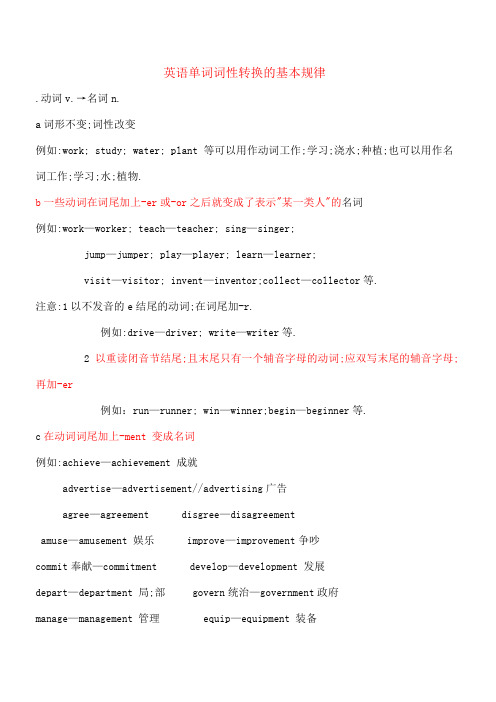
英语单词词性转换的基本规律.动词v.→名词n.a词形不变;词性改变例如:work; study; water; plant等可以用作动词工作;学习;浇水;种植;也可以用作名词工作;学习;水;植物.b一些动词在词尾加上-er或-or之后就变成了表示"某一类人"的名词例如:work—worker; teach—teacher; sing—singer;jump—jumper; play—player; learn—learner;visit—visitor; invent—inventor;collect—collector等.注意:1以不发音的e结尾的动词;在词尾加-r.例如:drive—driver; write—writer等.2以重读闭音节结尾;且末尾只有一个辅音字母的动词;应双写末尾的辅音字母;再加-er例如:run—runner; win—winner;begin—beginner等.c在动词词尾加上-ment 变成名词例如:achieve—achievement 成就advertise—advertisement//advertising广告agree—agreement disgree—disagreementamuse—amusement 娱乐 improve—improvement争吵commit奉献—commitment develop—development 发展depart—department 局;部 govern统治—government政府manage—management 管理 equip—equipment 装备有些单词比较特殊;需把动词后的e去掉再加ment.例如:argue—argument争论d在动词词尾加上-tion/sion变成名词例如: attract—attraction; instruct—instruction;invent—invention discuss—discussion;express—expression educate—education;graduate—graduation; operate—operation 去e再加"ion"compete—competition; organize—organization 把e改成其他字母再加"tion" decide—decision conclude—conclusion 把de改为s再加"ion"describe—description描写;描绘这是特例;不规则变化e在动词词尾加上-ance变成名词例如: appear—appearance 外貌;出现perform—performance 演出accept—acceptance 接受f在动词词尾加-ing变成名词方法与动词变为现在分词的方法相同例如:meet—meeting build—building wait—waiting bathe—bathing say—saying谚语 mean—meaningend —ending train —training wash—washing注意:以重读闭音节结尾;且末尾只有一个辅音字母的动词;应双写末尾的辅音字母;再加-ing如:swim—swimming shop—shopping begin—beginningg其他一些比较特殊的变化例如: Beg乞讨—beggar乞丐 behave行为举止—behaviorknow知道—knowledge知识 fly—flight 飞行heat 加热—heat热量 hit 撞击—hit 轰动一时的人或物;碰撞mix 混合—mixture混合物 press按;压—pressure压力sit坐—seat 座位 succeed—success成功tour—tour旅游/ tourist 游客2.动词v.→形容词adj.a动词后面加able;以e结尾的动词则去e加able;表示具有此性质;特点或属性.例如: afford-affordable;love-lovableb动词后面加ed;以e结尾的动词则直接加d;表示被动性的属性或特点.例如: scatter-scattered use-usedc不规则的动词则必须记忆;记住其过去分词形式.规律不大;意义同b.3.名词n.→形容词adj.a在名词后面加-y可以变成形容词尤其是一些与天气有关的名词例如: rain—rainy; cloud—cloudy; wind—windy; snow—snowy;health—healthy; luck—lucky;anger—angry guilt—guilty内疚的tourist—touristy游客多的 ; salt 盐—salty 咸的silk丝绸—silky丝绸般的; sleep—sleepy 昏昏欲睡的注意:1如果以重读闭音节结尾;且词尾只有一个辅音字母;这时应双写辅音字母再加"-y".如: sun—sunny; fun—funny; fog—foggy有雾的; fur—furry毛皮的2少数以不发音的e结尾的名词变为形容词时;应去掉e再加"-y".如: noise—noisy; ice—icy; shine—shiny发亮的; taste口味—tasty甜的b名词后面加-ed;以e结尾的直接加d.例如: spot斑点—spotted有斑点的; talent—talented 有天赋的organize—organized 有组织的; balance—balanced平衡的c一些抽象名词在词尾加-ful可以变为形容词例如:care—careful; thank—thankful; help—helpful;use—useful; meaning—meaningfuld在名词后加-less构成含有否定意义的形容词例如:care—careless粗心的; use—useless无用的hope—hopeless没希望的;home—homeless无家可归的e一些以-ce结尾的名词;把-ce改为-t变成形容词例如: difference—different; silence—silent; confidence—confidentf.在名词后加-ly变为形容词例如: friend—friendly; love—lovely; live---livelyg.在名词后加-ous变为形容词例如: danger—dangeroush名词后面加-al变为形容词例如: music—musical; medicine—medical 这个比较特殊i名词后面加-able变为形容词;如果以e结尾就去e再加"-able".例如: adjust—adjustable 可调整的 value—valuable有价值的j名词后面加-en变成形容词例如: wood—wooden 木制的 wool—woolen 羊毛的k一些表示国家的名词可以在词尾加-ese; -ish或-n构成表示国籍;语言的形容词例如:China—Chinese; Japan—Japanese; England—English;America—American; India—Indian; Australia —Australian 注意Canada—Canadian4..形容词adj.→副词adv.▲一般在形容词的词尾加-ly可以变成副词例如: quick—quickly; slow—slowly; loud—loudly; sudden—suddenly 等但是;以下几点值得注意:a 一些以"辅音字母+y"结尾的形容词;要把y改为i再加-ly例如: happy—happily; angry—angrily; lucky—luckily; heavy—heavily; noisy—noisilyb 有些以-ble或-le结尾的形容词;去掉e加-y例如:possible—possibly; terrible—terriblyc少数以e结尾的形容词;要去掉e再加-ly例如: true—truly但绝大多数以e结尾的形容词仍然直接加-ly 例如: polite—politely; wide—widely d以-l结尾的形容词变为副词时要在词尾加-ly;以-ll结尾的才在词尾只加-y.例如: usual—usually; careful—carefully; useful—usefullyfull—fully 以-ll结尾的才只加yOK;以上就是英语单词词性变化的一般规律;希望对大家有所帮助PS:有些同学可能对元音辅音以及重读闭音节不是很了解;那我在这里再做下补充说明. 1.英语26个字母中;a e i o u是元音字母; y是半元音字母; 其余都是辅音字母.★所谓半元音就是有时候做元音;有时候做辅音.半元音字母y做元音有: shy;sky做辅音比如最简单的:yes2.开音节和闭音节开音节分两种:绝对开音节和相对开音节绝对开音节指的是"元音字母结尾"的音节例如 we; hi等相对开音节是指"辅音字母-元音字母-辅音字母-不发音的e"的音节;r除外. 例如;take;make等比如:take 在这个单词中;t是辅音;a是元音;k是辅音;e是不发音的元音◆在开音节中; 元音字母发他们在字母表中的音闭音节; 则是指"辅音字母-元音字母-辅音字母"的音节 -al等除外例如:leg;cross 等◆在闭音节中;元音字母发不同的音a e i o u例 sat let sit not nut 试着读下这些单词;这些单词中;元音发的音都不是它们在字母表中发的音2.英语重读闭音节就是以辅音因素结尾的;而且是重读音节的音节.比如apple 划音节就因该是ap/ple 前面那个ap是一个音节;这个音节以辅音因素p结尾;所以就是闭音节.仅仅能看出是闭音节;是不是重读闭音节还要看这个音节是不是重读的重读闭音节三要素:1. 必须是重读音节;2. 最后只有一个辅音字母;3.元音字母发短元音说通俗点;打个比方; /u/是短元音;/u:/是长元音重读闭音节即两个辅音中间夹一个元音.如:sit---sitting begin---beginning重读在gin这个音节上●像travel这个单词;"vel"也是"辅音+元音+辅音"的结构;但是重音不在vel这个音节上;所以不用双写"l";可以为travelled;也可以是traveled;更常用的是后者.。
词汇学-词性转换法

02 应对四六级考试中词汇运用和语法结构的考察。
在翻译实践中的应用前景
通过词性转换法,准确传 达原文含义,保持译文流 畅自然。
丰富译文的表达方式和语 言风格,提高翻译质量。
应对不同语言间的词性差 异,提高翻译的灵活性和 准确性。
THANKS
感谢观看
副词转换为形容词
技巧:在副词后加上适当的形容词词 缀,如“-able”、“-ive”等,可以
将其转换为形容词。
"possible"原为副词,表示“可能 地”,去掉词缀“-ly”后变为形容词
"possible",表示“可能的”。
实例
"active"原为副词,表示“积极地”, 去掉词缀“-ly”后变为形容词 "active",表示“积极的、活跃的”。
形容词转换为副词
技巧:在形容词前加 上适当的副词词缀,
如“-ly”、“wise”等,可以将其
转换为副词。
实例
"quick"原为形容词, 表示“快速的”,加 上词缀“-ly”后变为 副词"quickly",表示
“快速地”。
"wise"原为形容词, 表示“明智的”,加 上词缀“-ly”后变为 副词"wisely",表示 “明智地、聪明地”。
动词转换为名词
技巧:在动词后加上适当的名词词缀,如“-tion”、 “-ment”、“-ance”等,可以将其转换为名词。
输标02入题
实例
01
03
"perform"原为动词,表示“表演、执行”,加上词 缀“-ance”后变为名词"performance",表示“表
词语的词性转换
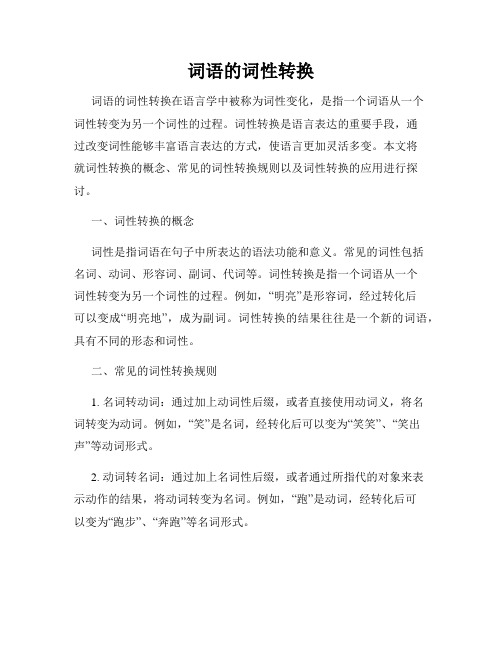
词语的词性转换词语的词性转换在语言学中被称为词性变化,是指一个词语从一个词性转变为另一个词性的过程。
词性转换是语言表达的重要手段,通过改变词性能够丰富语言表达的方式,使语言更加灵活多变。
本文将就词性转换的概念、常见的词性转换规则以及词性转换的应用进行探讨。
一、词性转换的概念词性是指词语在句子中所表达的语法功能和意义。
常见的词性包括名词、动词、形容词、副词、代词等。
词性转换是指一个词语从一个词性转变为另一个词性的过程。
例如,“明亮”是形容词,经过转化后可以变成“明亮地”,成为副词。
词性转换的结果往往是一个新的词语,具有不同的形态和词性。
二、常见的词性转换规则1. 名词转动词:通过加上动词性后缀,或者直接使用动词义,将名词转变为动词。
例如,“笑”是名词,经转化后可以变为“笑笑”、“笑出声”等动词形式。
2. 动词转名词:通过加上名词性后缀,或者通过所指代的对象来表示动作的结果,将动词转变为名词。
例如,“跑”是动词,经转化后可以变为“跑步”、“奔跑”等名词形式。
3. 形容词转副词:通过加上副词性后缀,或者去掉形容词的形容功能,使其表达修饰动作、程度、方式等意义的副词。
例如,“高兴”是形容词,经转化后可以变为“高兴地”、“欢乐地”等副词形式。
4. 副词转形容词:通过加上形容词性后缀,或者通过表示程度的副词来表示一种性质或状态,将副词转变为形容词。
例如,“迅速”是副词,经转化后可以变为“迅速的”、“快速的”等形容词形式。
三、词性转换的应用1. 丰富词语的表达:通过词性转换可以丰富词语的表达方式,使句子更加生动有趣。
例如,“飞”(动词)可以转化为“飞行”(名词),以扩展其表达范围。
2. 增强修饰手段:通过将形容词转化为副词,可以更准确地表达出动作的方式、程度等。
例如,“快”(形容词)可以转化为“快速地”(副词),表示动作的速度或方式。
3. 提高句子的连贯性:通过词性转换,可以使词语在句子中的词性统一,增强句子的连贯性。
词性转换

词性转换Danger N→ dangerous Adj 危险的Fun N → funny Adj 有趣的Africa → African 非洲人的America → American 美国的Asia→ Asian 亚洲的Europe →European 欧洲的Health健康→ healthy 健康的Beauty 美丽→beautiful 美丽的Luck →lucky幸运的反义词unlucky Tradition → t raditional 传统的Use V→ useful 有用的AdjHelpV → helpful 有助的,有益的AdjHappy→ 反义词:unhappy Expensive=dear → 反义词:cheap strange:奇怪的Adj → stranger:陌生人Nworry: 担心V→worried: 担心的Adjcheer: 为……喝彩V →cheerful: 快乐的,愉快的Adjwin:赢V→ winner:胜利者Nrain N → ra iny Adjtour旅行→tourist游客/tourism 旅游业succeed V→ success N →successful Adj die V→ dead Adj → death N 死亡marry V →married Adj 结婚的relax V → relaxed/ relaxing Adj 放松的,轻松的noise N → noisy Adj 喧闹的visit V → visitor N 拜访者gold N→ golden Adj 金色的write V → writ er N 作家build V → building N 建筑物Germany N → German Adj 德国人的Health N——healthy Adj —— healthily Adv—— unhealthy 反义词mean V →meaning N 意思,含义advise V →advice N 建议practise V →practice N 练习pronounce V →pronunciation N 发音suggest V →suggestion N 建议possible Adj →impossible →possibility N 可能性choose V →choice N 选择nature N → natural Adj 自然的culture N →cultural Adj 文化的difficult Adj → difficulty N 困难important Adj → importance N 重要性confident Adj → confidence N 自信silent Adj → silence N 沉默different Adj →diffe rence N 差异appear V →appearance N 外貌,露面enjoy V →enjoyable Adj 快乐的,令人愉快的invite V → invitation N 邀请comfort N → comfortable Adj 舒适的widen V →wide Adj→ width N 宽度deepen V →deep Adj→depth N 深度east/west/north/southN→east ern/west ern Adjcareful →careles s 粗心的close V →closed Adj 关闭的crowd N → crowded Adj 拥挤的actress →actor 女演员/男演员nation N →national Adj 国家的,民族的tradition N →traditional Adj 传统的land V → landing N 登入solve V → solution N 解决方案peace N →peaceful Adj 和平的produce V → production N 生产medicine N →medical Adj 医疗的taste V →tasty Adj 好吃的salt N →salty Adj 咸的surprise N →surprised/surprising Adj 令人感到奇怪的cloud/wind/rain/snow/sun N →cloud y/wind y/rain y/snow y/sun ny Adj show V →shower N 阵雨protect V →protection N 保护discuss V →discussion Nproud Adj → prid e N 骄傲strange Adj → stranger N 陌生人interest N→ interested/interesting Adj invent V→ invention N 发明Germany N→ Germans 德国人/德国的West N→western Adj 西方的Cook V→ cook 厨师cooker 厨具N Possible → impossible 反义词不可能Communicate V→ communication N 交流Explain V→ explanation N 解释,说明Introduce V→ introduction N 介绍Expect V→ expectation N Environment N →Environmental Adj 环境的Nation N→ national Adj国家的Culture N→ cultural Adj 文化的Centre N→central Adj 中心的Ill N→ illness N 疾病Sleep V→ Adj sleepy 困的,恹恹欲睡的sleeping /asleep 睡着的Weak Adj → weakness N 虚弱的Humor N→ humorous Adj 幽默的Satisfy V→ Adj satisfied 满意的Noise N→ noisy Adj 吵闹的,喧哗的Value N→ valuable Adj 有价值的Success N→ successful Adj →V succeed 成功Pleasure N→ pleased(主语是“人”高兴的,满意地/ pleasant(主语是“物”使人感到高兴,愉快AdjWeigh V→ weight N体重Short Adj → shorts N 短裤Thirst N→ thirsty Adj 口渴得late Adj → latest 最近的develop V→ developing/developed 发展中/发达国家→developmentpass V→ past过去的Adj→Adv 经过Wake V→ awake N 醒着的Lone 孤独的,无伴的,孤零零的Lonely 情感上的孤单Alone 独自Silence N→ silent Adj 安静的Avoid V → avoidable → avoidance 避免NMarry V → marriage N 婚姻Present V → presenter N 主持人interview V → interviewee 被面试的人/interviewer 面试的人die V → dying 垂死的,即将要死的dead 死了的Adj→ death NLove V→lovely 可爱的Adj loving 慈祥的Decide V→ decision N 决定Own V→owner N 主人Satisfy V→ satisfied Adj→ satisfaction N 满足Excited Adj→ excitement N 激动Broke V→ broken Adj 破碎的Kind Adj→ kindness N 仁慈,好意Fair Adj→ unfair 不公平Ice N→ iced Adj 结冰的Old → elder=older 年长的Kid N→ kidding 玩笑True Adj→ truth N 真理,真相Achieve V →achievement N 成就Keep V →keeper N 看守人,保安,饲养人Remain V → remaining Adj 剩余的Independent Adj → independence N 独立。
词性转换的技巧
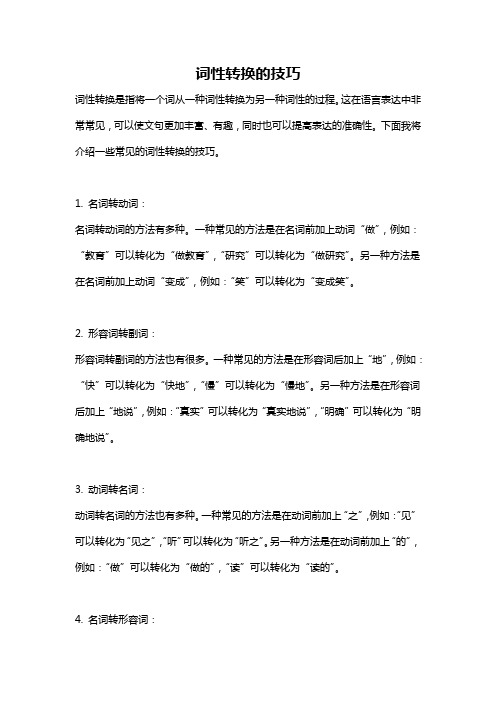
词性转换的技巧词性转换是指将一个词从一种词性转换为另一种词性的过程。
这在语言表达中非常常见,可以使文句更加丰富、有趣,同时也可以提高表达的准确性。
下面我将介绍一些常见的词性转换的技巧。
1. 名词转动词:名词转动词的方法有多种。
一种常见的方法是在名词前加上动词“做”,例如:“教育”可以转化为“做教育”,“研究”可以转化为“做研究”。
另一种方法是在名词前加上动词“变成”,例如:“笑”可以转化为“变成笑”。
2. 形容词转副词:形容词转副词的方法也有很多。
一种常见的方法是在形容词后加上“地”,例如:“快”可以转化为“快地”,“慢”可以转化为“慢地”。
另一种方法是在形容词后加上“地说”,例如:“真实”可以转化为“真实地说”,“明确”可以转化为“明确地说”。
3. 动词转名词:动词转名词的方法也有多种。
一种常见的方法是在动词前加上“之”,例如:“见”可以转化为“见之”,“听”可以转化为“听之”。
另一种方法是在动词前加上“的”,例如:“做”可以转化为“做的”,“读”可以转化为“读的”。
4. 名词转形容词:名词转形容词的方法有多种。
一种常见的方法是在名词后加上“的”,例如:“困难”可以转化为“困难的”,“美丽”可以转化为“美丽的”。
另一种方法是在名词前加上“具有”,例如:“价值”可以转化为“具有价值的”,“特点”可以转化为“具有特点的”。
5. 副词转动词:副词转动词的方法也有多种。
一种常见的方法是在副词后加上动词“做”,例如:“迅速”可以转化为“迅速做”,“安静”可以转化为“安静做”。
另一种方法是在副词后加上动词“变成”,例如:“成形”可以转化为“变成成形”,“明亮”可以转化为“变成明亮”。
6. 状语转形容词:状语转形容词的方法也有多种。
一种常见的方法是在状语前加上形容词“是”,例如:“完全”可以转化为“是完全的”,“不可避免”可以转化为“是不可避免的”。
另一种方法是在状语前加上形容词“之”,例如:“明显”可以转化为“之明显”,“难以置信”可以转化为“之难以置信”。
英语单词词性转换

英语单词词性转换一、动词v.→名词n.1、词尾加上-er或-or之后就变成了表示"某一类人"的名词例如:work—worker, teach—teacher, sing—singer,jump—jumper, play—player, learn—learner,visit—visitor, invent—inventor,collect—collector等.注意:1以不发音的e结尾的动词,在词尾加-r.例如:drive—driver, write—writer等.2以辅音字母开头并以元音字母加辅音字母结尾的单词,应双写末尾的辅音字母再加er; 例如:run—runner, win—winner,begin—beginner等.2.在动词词尾加上-ment 变成名词例如:achieve—achievement 成就advertise—advertisement例如:argue—argument争论3.在动词词尾加上-tion/sion变成名词例如: attract—attraction; instruct—instruction;invent—invention discuss—discussion;express—expression educate—education;graduate—graduation; operate—operation 去e再加"ion"compete—competition; organize—organization 把e改成其他字母再加"tion"decide—decision conclude—conclusion 把de改为s再加"ion"describe—description描写,描绘这是特例,不规则变化4.在动词词尾加上-ance变成名词例如: appear—appearance 外貌;出现perform—performance 演出accept—acceptance 接受resist-resistance n.抵抗,阻力5.在动词词尾加-ing变成名词方法与动词变为现在分词的方法相同例如:meet—meeting build—building wait—waitingbathe—bathing say—saying谚语 mean—meaning注意:以辅音字母开头并以元音字母加辅音字母结尾的单词,应双写末尾的辅音字母再加-ing 如:swim—swimming shop—shopping begin—beginning二、动词v.→形容词adj.1.动词后面加able,以e结尾的动词则去e加able,表示具有此性质,特点或属性.例如: afford-affordable;love-lovable2.动词后面加ed,以e结尾的动词则直接加d,表示被动性的属性或特点.例如: scatter-scattered use-used3不规则的动词则必须记忆,记住其过去分词形式.规律不大,意义同b.三.名词n.→形容词adj.1.在名词后面加-y可以变成形容词尤其是一些与天气有关的名词例如: rain—rainy, cloud—cloudy, wind—windy, snow—snowy,health—healthy, luck—lucky,anger—angry guilt—guilty内疚的tourist—touristy游客多的 , salt 盐—salty 咸的silk丝绸—silky丝绸般的, sleep—sleepy 昏昏欲睡的注意:1如果以辅音字母开头并以元音字母加辅音字母结尾,这时应双写辅音字母再加"-y".如: sun—sunny, fun—funny, fog—foggy有雾的, fur—furry毛皮的2少数以不发音的e结尾的名词变为形容词时,应去掉e再加"-y".如: noise—noisy, ice—icy, shine—shiny发亮的, taste口味—tasty甜的2.名词后面加-ed,以e结尾的直接加d.例如: spot斑点—spotted有斑点的; talent—talented 有天赋的organize—organized 有组织的; balance—balanced平衡的3.一些抽象名词在词尾加-ful可以变为形容词例如:care—careful, thank—thankful, help—helpful,use—useful, meaning—meaningful4.在名词后加-less构成含有否定意义的形容词例如:care—careless粗心的, use—useless无用的hope—hopeless没希望的,home—homeless无家可归的5.一些以-ce结尾的名词,把-ce改为-t变成形容词例如: difference—different, silence—silent, confidence—confident 6.在名词后加-ly变为形容词例如: friend—friendly, love—lovely, live---lively7.在名词后加-ous变为形容词例如: danger—dangerous prosperous a 繁荣的pro 在前+sper 希望+ous 8.名词后面加-al变为形容词例如: music—musical; medicine—medical 这个比较特殊9名词后面加-able变为形容词,如果以e结尾就去e再加"-able".例如: adjust—adjustable 可调整的 value—valuable有价值的10.名词后面加-en变成形容词例如: wood—wooden 木制的 wool—woolen 羊毛的四.形容词adj.→副词adv.▲一般在形容词的词尾加-ly可以变成副词例如: quick—quickly, slow—slowly, loud—loudly, sudden—suddenly 等例如:possible—possibly, terrible—terribly。
英语单词词性转换
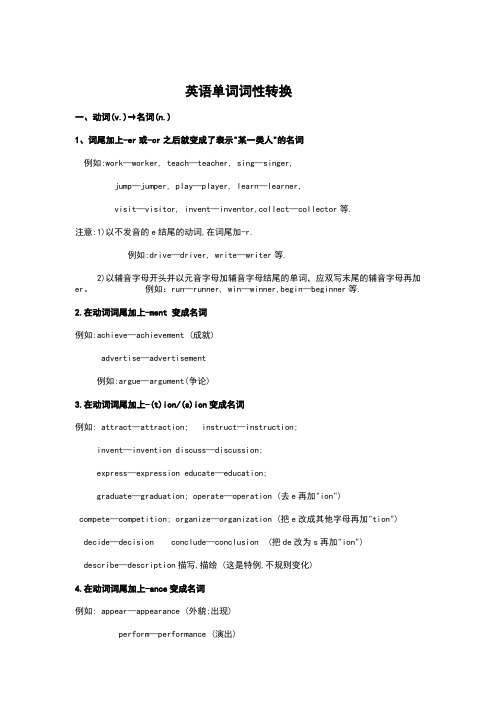
英语单词词性转换一、动词(v.)→名词(n.)1、词尾加上-er或-or之后就变成了表示"某一类人"的名词例如:work—worker, teach—teacher, sing—singer,jump—jumper, play—player, learn—learner,visit—visitor, invent—inventor,collect—collector等.注意:1)以不发音的e结尾的动词,在词尾加-r.例如:drive—driver, write—writer等.2)以辅音字母开头并以元音字母加辅音字母结尾的单词,应双写末尾的辅音字母再加er。
例如:run—runner, win—winner,begin—beginner等.2.在动词词尾加上-ment 变成名词例如:achieve—achievement (成就)advertise—advertisement例如:argue—argument(争论)3.在动词词尾加上-(t)ion/(s)ion变成名词例如: attract—attraction; instruct—instruction;invent—invention discuss—discussion;express—expression educate—education;graduate—graduation; operate—operation (去e再加"ion")compete—competition; organize—organization (把e改成其他字母再加"tion")decide—decision conclude—conclusion (把de改为s再加"ion")describe—description描写,描绘 (这是特例,不规则变化)4.在动词词尾加上-ance变成名词例如: appear—appearance (外貌;出现)perform—performance (演出)accept—acceptance (接受)resist-resistance n.抵抗,阻力5.在动词词尾加-ing变成名词 (方法与动词变为现在分词的方法相同)例如:meet—meeting build—building wait—waitingbathe—bathing say—saying(谚语) mean—meaning注意:以辅音字母开头并以元音字母加辅音字母结尾的单词,应双写末尾的辅音字母再加-ing如:swim—swimming shop—shopping begin—beginning二、动词(v.)→形容词(adj.)1.动词后面加able,以e结尾的动词则去e加able,表示具有此性质,特点或属性.例如: afford-affordable;love-lovable2.动词后面加ed,以e结尾的动词则直接加d,表示被动性的属性或特点.例如: scatter-scattered use-used3不规则的动词则必须记忆,记住其过去分词形式.规律不大,意义同(b).三.名词(n.)→形容词(adj.)1.在名词后面加-y可以变成形容词(尤其是一些与天气有关的名词)例如: rain—rainy, cloud—cloudy, wind—windy, snow—snowy,health—healthy, luck—lucky,anger—angry guilt—guilty(内疚的)tourist—touristy(游客多的) , salt (盐)—salty (咸的)silk(丝绸)—silky(丝绸般的), sleep—sleepy (昏昏欲睡的)注意:1)如果以辅音字母开头并以元音字母加辅音字母结尾,这时应双写辅音字母再加"-y".如: sun—sunny, fun—funny, fog—foggy(有雾的), fur—furry(毛皮的)2)少数以不发音的e结尾的名词变为形容词时,应去掉e再加"-y".如: noise—noisy, ice—icy, shine—shiny(发亮的), taste(口味)—tasty(甜的) 2.名词后面加-ed,以e结尾的直接加d.例如: spot(斑点)—spotted(有斑点的); talent—talented (有天赋的)organize—organized 有组织的; balance—balanced(平衡的)3.一些抽象名词在词尾加-ful可以变为形容词例如:care—careful, thank—thankful, help—helpful,use—useful, meaning—meaningful4.在名词后加-less构成含有否定意义的形容词例如:care—careless(粗心的), use—useless(无用的)hope—hopeless(没希望的),home—homeless(无家可归的)5.一些以-ce结尾的名词,把-ce改为-t变成形容词例如: difference—different, silence—silent, confidence—confident6.在名词后加-ly变为形容词例如: friend—friendly, love—lovely, live---lively7.在名词后加-ous变为形容词例如: danger—dangerous prosperous a 繁荣的(pro 在前+sper 希望+ous)8.名词后面加-al变为形容词例如: music—musical; medicine—medical (这个比较特殊)9名词后面加-able变为形容词,如果以e结尾就去e再加"-able".例如: adjust—adjustable 可调整的 value—valuable有价值的10.名词后面加-en变成形容词例如: wood—wooden 木制的 wool—woolen 羊毛的四.形容词(adj.)→副词(adv.)▲一般在形容词的词尾加-ly可以变成副词例如: quick—quickly, slow—slowly, loud—loudly, sudden—suddenly 等例如:possible—possibly, terrible—terribly。
词性转换规律
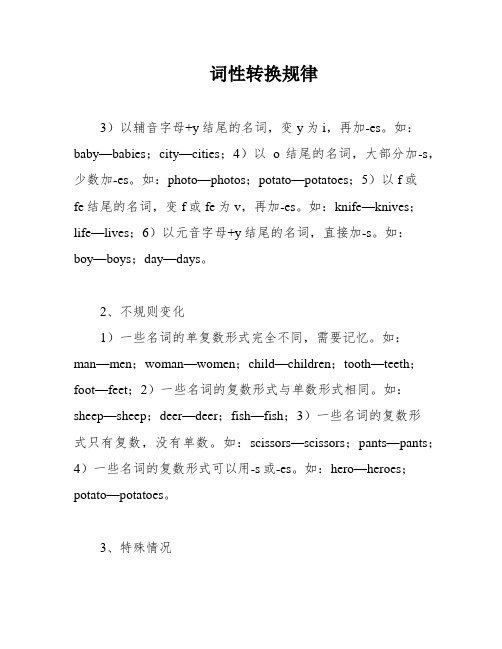
词性转换规律3)以辅音字母+y结尾的名词,变y为i,再加-es。
如:baby—babies;city—cities;4)以o结尾的名词,大部分加-s,少数加-es。
如:photo—photos;potato—potatoes;5)以f或fe结尾的名词,变f或fe为v,再加-es。
如:knife—knives;life—lives;6)以元音字母+y结尾的名词,直接加-s。
如:boy—boys;day—days。
2、不规则变化1)一些名词的单复数形式完全不同,需要记忆。
如:man—men;woman—women;child—children;tooth—teeth;foot—feet;2)一些名词的复数形式与单数形式相同。
如:sheep—sheep;deer—deer;fish—fish;3)一些名词的复数形式只有复数,没有单数。
如:scissors—scissors;pants—pants;4)一些名词的复数形式可以用-s或-es。
如:hero—heroes;potato—potatoes。
3、特殊情况1)有些名词的复数形式有两种,但含义不同。
如:brother—brothers(兄弟),brethren(同教会的);die—dies (模具),dice(骰子);2)有些名词的复数形式有两种,但用法不同。
如:XXX(衣服)在表示“一件衣服”时,是不可数名词,没有复数形式;但在表示“衣服”时,是可数名词,有复数形式。
To form XXX + y。
change y to i and add es。
For example。
baby es babies。
city es cities。
and family es families.To form the plural of words ending in f or fe。
change f or fe to ves。
For example。
XXX。
XXX。
词性转换

一、词性转换:adj.-adv.1.rude – rudely2.angry – angrily3.busy – busily4.possible – possiblyfortable – comfortably6.true – truly7.extreme – extremely8.simple – simply 9.magic – magically 10.public – publiclyn. - adj.1.centre– central2.practice – practical3.nature – natural4.politics – political5.north– north6.access – accessible7.terror – terrible8.mercy– merciful/merciless 9.beauty – beautiful 10.self – selfish/selfless11.anxiety– anxious 12.ambition – ambitious 13.significance – significant14.absence– absent 15.convenience – convenient 16.efficiency – efficient17.time– timely 18.friend – friendlyadj. – n.1.responsible– responsibility2.flexible – flexibility3.difficult – difficulty4.sunny– sun5.noisy – noise6.sad – sadness7.happy – happiness8.strong– strength 9.true – truth 10.private –privacy 11.free – freedom12.safe– safety 13.brave – bravery 14.short – shortage 15.wise – wisdom v.-n.1.expect– expectation2.explain – explanation3.invite – invitation4.pronounce– pronunciation5.prepare –preparation6.introduce- introduction7.describe– description 8.contribute – contribution 9.intend – intension10.discuss– discussion 11.admit – admission 12.conclude – conclusion13.appear– appearance 14.guide – guidance 15.exist –existence16.prefer– preference 17.agree – agreement 18.announce – announcement19.arrive– arrival 20.refuse – refusal 21.fail – failure 22.press – pressure23.discover– discovery 24.choose – choice 25.advise – advice26.apologize– apology 27.grow – growthv. – adj. (1-7) & adj. –v(8-12)1.rely– reliable2.reason – reasonable3.doubt –doubtful4.harm– harmful/harmless5.impress – impressive6.create – creative7.imagine– imaginary 8.deep – deepen 9.less – lessen rge –enlarge11.rich– enrich 12.able – enable表示人的后缀1.village– villager2.visit – visitor3.interview – interviewer4.employ– employee/employer5.host – host/hostess6.Australia – Australian– Asian 8.music – musician 9.library-librarian 10.novel – novelist11.tour– tourist 12.apply – applicant 13.consult – consultant 14.lie – liar15.beg– beggar表示否定的前缀和后缀1.appear– disappear2.legal – illegal3.polite – impolite4.patient – impatient5.convenient– inconvenient6.understand – misunderstand7.fair – unfair8.fortunate– unfortunate 10.hope – hopeless 11.end – endless 12.taste – tasteless比较级和最高级1.tall– taller – tallest2.heavy – heavier – heaviest3.big – bigger – biggest4.thin– thinner – thinnest5.slowly – more slowly – most slowly6.good/well – better – best7.little – less –least8.few – fewer – fewest9.bad / badly / ill – worse – worst 10.many / much – more –most11.old–older – oldest 12.far –farther/further – farthest /furthest名词单数变复数1.approach– approaches2.stomach – stomachs3.activity – activities4.story– stories5.thief – thieves6.self – selves7.leaf – leaves8.roof– roofs 9.safe –safes 10.here – heroes 11.tomato – tomatoes12.photo– photos 13.foot – feet 14.mouse – mice 15.child – children16.sheep– sheep 17.tooth – teeth 18.zoo – zoos不定冠词a 还是an1.an honest man2.an honor3.an hour4.a European country5.a one-way ticket6.a unit7.a university8.an unhappy girl9.a usual answer 10.a“u”11.an“f”12.an“s”高考加油金榜题名。
英语词性转换
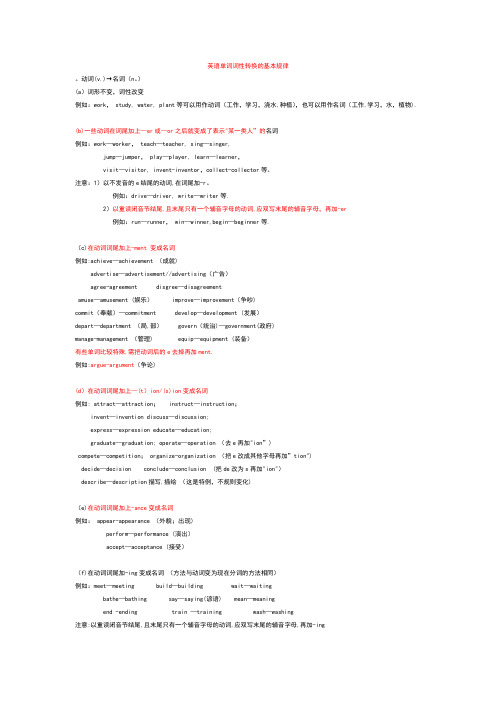
英语单词词性转换的基本规律。
动词(v.)→名词(n。
)(a)词形不变,词性改变例如:work, study, water, plant等可以用作动词(工作,学习,浇水,种植),也可以用作名词(工作,学习,水,植物).(b)一些动词在词尾加上—er或—or之后就变成了表示"某一类人”的名词例如:work—worker, teach—teacher, sing—singer,jump—jumper, play—player, learn—learner,visit—visitor, invent-inventor,collect-collector等。
注意:1)以不发音的e结尾的动词,在词尾加-r。
例如:drive—driver, write—writer等.2)以重读闭音节结尾,且末尾只有一个辅音字母的动词,应双写末尾的辅音字母,再加-er例如:run—runner, win—winner,begin—beginner等.(c)在动词词尾加上-ment 变成名词例如:achieve—achievement (成就)advertise—advertisement//advertising(广告)agree-agreement disgree—disagreementamuse—amusement (娱乐) improve—improvement(争吵)commit(奉献)—commitment develop—development (发展)depart—department (局,部) govern(统治)—government(政府)manage-management (管理) equip—equipment (装备)有些单词比较特殊,需把动词后的e去掉再加ment.例如:argue-argument(争论)(d)在动词词尾加上—(t)ion/(s)ion变成名词例如: attract—attraction; instruct—instruction;invent—invention discuss—discussion;express—expression educate—education;graduate—graduation; operate—operation (去e再加"ion”)compete—competition; organize-organization (把e改成其他字母再加”tion")decide—decision conclude—conclusion (把de改为s再加"ion")describe—description描写,描绘(这是特例,不规则变化)(e)在动词词尾加上-ance变成名词例如: appear-appearance (外貌;出现)perform—performance (演出)accept—acceptance (接受)(f)在动词词尾加-ing变成名词(方法与动词变为现在分词的方法相同)例如:meet—meeting build—building wait—waitingbathe—bathing say—saying(谚语) mean—meaningend -ending train —training wash—washing注意:以重读闭音节结尾,且末尾只有一个辅音字母的动词,应双写末尾的辅音字母,再加-ing如:swim—swimming shop—shopping begin—beginning(g)其他一些比较特殊的变化例如: Beg(乞讨)—beggar(乞丐) behave(行为举止)—behaviorknow(知道)—knowledge(知识) fly-flight (飞行)heat (加热)—heat(热量) hit (撞击)—hit(轰动一时的人或物,碰撞)mix (混合)-mixture(混合物) press(按,压)—pressure(压力)sit(坐)-seat (座位) succeed—success(成功)tour—tour(旅游)/ tourist (游客)2.动词(v.)→形容词(adj。
高中英语词性转换规律归纳
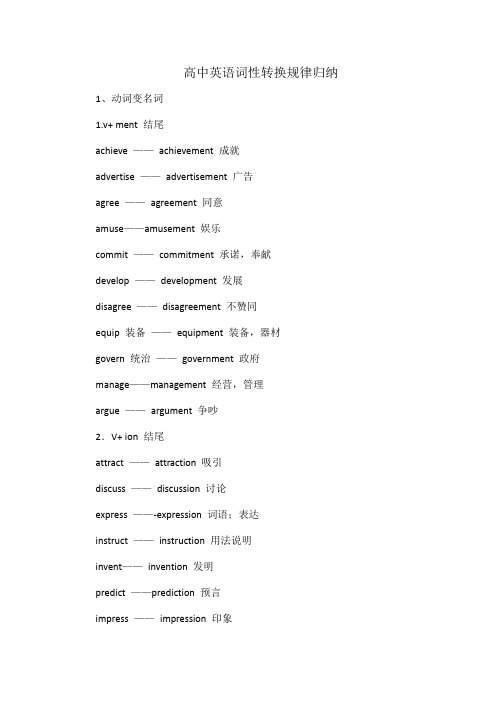
高中英语词性转换规律归纳1、动词变名词1.v+ ment 结尾achieve ——achievement 成就advertise ——advertisement 广告agree ——agreement 同意amuse——amusement 娱乐commit ——commitment 承诺,奉献develop ——development 发展disagree ——disagreement 不赞同equip 装备——equipment 装备,器材govern 统治——government 政府manage——management 经营,管理argue ——argument 争吵2.V+ ion 结尾attract ——attraction 吸引discuss ——discussion 讨论express ——-expression 词语;表达instruct ——instruction 用法说明invent——invention 发明predict ——prediction 预言impress ——impression 印象suggest ——suggestion 建议,暗示educate ——education 教育graduate ——graduation 毕业operate ——operation 操作,动手术illustrate ——illustration 阐明,举例说明pollute ——pollution 污染introduce ——introduction 介绍organize ——organization组织imagine ——imagination 想象力inspire——inspiration 灵感,鼓舞人心的事invite ——invitation 邀请compete ——competition 竞争,比赛pronounce ——pronunciation发音admit ——admission 承认permit ——permission 允许conclude ——conclusion 结论decide ——decision 决定describe ——description描写,描绘resolve ——resolution 决心solve ——solution 解决方法3.V+ ance 结尾allow ——allowance 允许appear ——appearance 外貌,出现perform ——performance 演出exist ——existence 存在4.V+ ing 结尾end ——ending 结尾,结局train ——training训练mean ——meaning 意义say——saying 谚语remind ——reminding提醒bathe ——bathing沐浴5.词尾加-er或-or后变成表示“某一类人”的名词work——worker 工人teach——teacher老师sing——singer 歌手jump——jumper跳高运动员play——player表演者、运动员learn——learner 学习者visit——visitor访问者invent——inventor发明家6.V+ 其他beg——beggar 乞丐sit——seat 座位believe ——belief 信仰behave ——behavior 行为know——knowledge 知识fly——flight 飞行mix ——mixture 混合物press ——pressure 压力serve ——service 服务succeed ——success 成功pursue ——pursuit 追求,从事propose ——proposal 建议withdraw ——withdrawal 取钱;收回;撤退survive ——survival--survivor 幸存者arrive ——arrival到达analyze ——analysis 分析2、形容词变名词1.词尾ent改为ency或enceefficient有效率的——efficiency 效率patient——patience/impatience 耐性/无耐心dependent——dependence依赖性independent——independence 独立性urgent——urgency 紧急2.ble结尾,ble改为bilitypossible——possibility 可能responsible——responsibility 责任;职责3.其他accurate——accuracy 准确性prosperous——prosperity 繁荣true——truth 真相wide——width 宽度long——length 长度high——height 高度3、名词/动词变形容词1.名词+yguilt 罪恶——guilty 内疚的health——healthy 健康的luck——lucky 幸运的cloud——cloudy 多云的wind—windy 多风的rain——rainy 多雨的snow——snowy 多雪的tourist ——touristy 游客多的er结尾,改er为ry hunger——hungry 饥饿的anger ——angry 生气的fog——foggy 有雾的sun——sunny 阳关灿烂的fur——furry 毛皮的shine——shiny 发亮的taste ——tasty 美味的2. 名词/动词+ ed以辅音+辅音结尾的单词,直接加edtalent ——talented 有天赋的offend ——offended 生气的crowd ——crowded 拥挤的以元音字母e结尾的单词直接加dbalance ——balanced 平衡的organize——organized 有组织的pollute ——polluted 被污染的please ——pleased 高兴的元音加辅音结尾的单词,词尾辅音双写再加edspot ——spotted 有斑点的3.名词+ ful/lesscare ——careful/ careless 小心的/ 粗心的help——helpful / helpless 有帮助的/ 无助的use——useful/ useless有用的/ 无用的meaning ——meaningful / meaningless有意义的/无意义的colour——colourful /colourless多彩的/无色的pain 疼痛——painful /painless痛苦的/ 不痛的thank——thankful / thankless 充满感激的/ 不知感恩的peace 和平——peaceful 和平的play游戏——playful 爱玩耍的home ——homeless 无家可归的4.名词/动词+ ablechange ——changeable 易变的adjust——adjustable 可调整的comfort——comfortable 舒适的knowledge——knowledgeable 知识渊博的suit ——suitable 合适的动词以辅音加y结尾把y变i 加able ,deny——deniable 可否认的rely——reliable 可靠的5.名词+ ouscourage——courageous 勇敢的danger——dangerous 危险的以y结尾,改y为i再加ousmystery 神秘——mysterious 神秘的6.ce 变tconfidence——confident 自信的difference——different 不同的dependence ——dependent 依赖他人的independence——independent 独立的7.词尾加aladdition——additional 附加的,额外的music——musical 音乐的person——personal (私人的) nation——national 国家的education——educational有教育意义的tradition——traditional 传统的origin起源——original 新颖的;独创的以元音字母e 结尾的单词,去掉词尾元音加al nature——natural 自然的globe——global 全球的特例:class——classical 经典的medicine 药——medical 医学的grammar——grammatical 语法的8.名词+ lyfriend——friendly 友好的live——lively 活跃的,有生气的love——lovely 可爱的week——weekly 每周的man——manly 男子气概的;强壮的9.词尾+ enwood——wooden 木制的wool——woolen 羊毛的10. 表示方位的词East——easternWest——westernSouth——southernNorth——northern11.四大洲Asia 亚洲——AsianAfrica 非洲——AfricanEurope欧洲——EuropeanAmerica 美洲——American12. 其他energy精力——energetic 精力充沛的strategy——strategic 战略的scientist——scientific 科学的fool 傻子——foolish 愚蠢的love——loving 慈爱的pleasure——pleasant令人愉快的/ pleased高兴的pride——proud 自豪的4、形容词变动词1.词尾加ize modern——modernize 使...现代化social——socialize 使...社会化2.词尾加enfast——fasten 使固定;集中于short——shorten 缩短wide——widen 放宽less——lessen 使...减少特例(有变形):long——lengthen 使延长strong ——strengthen 加强;巩固3.词前加enlarge ——enlarge 扩大;放大5、形容词变副词1.形容词+ lybad——badly 坏地bright——brightly 明亮地casual——casually 随意地clear——clearly 清楚地complete——completely 完全correct——correctly 正确地final——finally 最后fortunate——fortunately幸运地general——generally 一般来讲loud——loudly 大声地particular ——particularly特别地polite——politely 礼貌地proper ——properly适当地main——mainly 主要地most ——mostly 多半,大多数normal——normally 正常地quick——quickly 迅速地quiet——quietly 轻轻地,安静地real——really 真正地recent ——recently 最近;近来sad——sadly 悲哀地slow——slowly 缓慢地special——specially 专门,特殊地specific——specifically 特定地,明确地strong——strongly 坚决地,强烈地sudden——suddenly突然usual——usually 通常2. 以le 结尾的,去e + y comfortable——comfortably 舒服地gentle——gently 温柔地possible——possibly 可能地simple——simply 仅仅;只;简单地terrible——terribly 非常;极度地3. 辅音字母+ y 变y为ily easy——easily 容易地heavy——heavily 沉重地happy——happily 快乐地4.特殊good——well好地true——truly 真实地。
什么是词性转换举例说明

1.什么是词性转换举例说明?
答:词性转换是指一般的名词、动词、形容词、副词可以在添加或减去一些前或后缀后得到新的单词。
名词转译成动词,一些由动词词根派生的名词以及含有动作意味的名词常可转译为汉语的动词,英语中介词的使用频率相对于汉语来说要高得多,实际上英语中很多介词在语境中可带有明显的动作意味。
英语词性转换类型
(1)v,-n动词转化为名词,
post-postagemail-mailweigh-weightadvise-advice。
(2)v,-n,-a动词转化成名词-形容词
act-actor/actress-activechange-change-changeable。
(3)v,-a-,ad,-n动词转化成形容词,副词,名词fill-full,
need-necessary-necessarilyinterest(v/n)interested/interesting。
(4)n,an,a名词转化为形容词personpersonal(个人的;私人的)funfunny。
词性转换规律
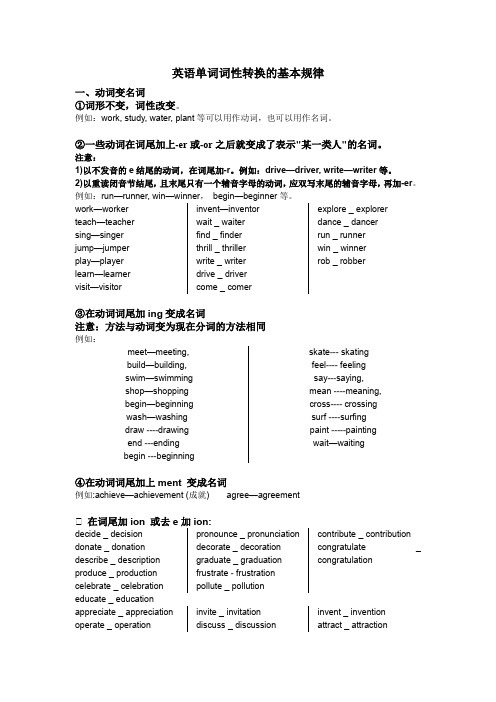
英语单词词性转换的基本规律一、动词变名词①词形不变,词性改变。
例如:work, study, water, plant等可以用作动词,也可以用作名词。
②一些动词在词尾加上-er或-or之后就变成了表示"某一类人"的名词。
注意:1)以不发音的e结尾的动词,在词尾加-r。
例如:drive—driver, write—writer等。
2)以重读闭音节结尾,且末尾只有一个辅音字母的动词,应双写末尾的辅音字母,再加-er。
例如:run—runner, win—winner,begin—beginner等。
work—worker teach—teacher sing—singer jump—jumper play—player learn—learner visit—visitor invent—inventorwait _ waiterfind _ finderthrill _ thrillerwrite _ writerdrive _ drivercome _ comerexplore _ explorerdance _ dancerrun _ runnerwin _ winnerrob _ robber③在动词词尾加ing变成名词注意:方法与动词变为现在分词的方法相同例如:meet—meeting, build—building, swim—swimming shop—shopping begin—beginning wash—washing draw ----drawing end ---ending begin ---beginning skate--- skating feel---- feeling say---saying, mean ----meaning, cross---- crossing surf ----surfing paint -----painting wait—waiting④在动词词尾加上ment 变成名词例如:achieve—achievement (成就) agree—agreement ⑤在词尾加ion 或去e加ion:decide _ decision donate _ donation describe _ description produce _ production celebrate _ celebration pronounce _ pronunciationdecorate _ decorationgraduate _ graduationfrustrate - frustrationpollute _ pollutioncontribute _ contributioncongratulate _congratulationeducate _ educationappreciate _ appreciation operate _ operation invite _ invitationdiscuss _ discussioninvent _ inventionattract _ attraction⑥其他一些比较特殊的变化know ---- knowledge please ---pleasure enjoy--- enjoyment practise--- practice die ---death succeed--- success weigh ---weight sit-- seatchange --chance enter --entrancefly --flightdiscover-- discovery appear-- appearance breathe-- breath二、名词变形容词①在名词后面加-y可以变成形容词(尤其是一些与天气有关的名词)例如: rain—rainy, cloud—cloudy, salt —salty sleep—sleepy注意:1)如果以重读闭音节结尾,且词尾只有一个辅音字母,这时应双写辅音字母再加"-y".如: sun—sunny, fun—funny, fog—foggy2)少数以不发音的e结尾的名词变为形容词时,应去掉e再加"-y".如: noise—noisy, ice—icy②名词后面加-ed,以e结尾的直接加d,表示被动性的属性或特点.talent—talented (有天赋的) use-usedplease - pleasedunite - unitedexcite - excitedclose - closedrelax - relaxed surprise - surprised, develop - developed interest - interested crowd - crowded pollute - polluted③一些抽象名词在词尾加-ful可以变为形容词use - useful care - careful, help - helpful, thank - thankful peace - peaceful, forget - forgetful, play - playful, succeed - successful, wonder - wonderful④在名词后加-less构成含有否定意义的形容词例如:care—careless, use—uselesshope—hopeless,home—homeless⑤一些以-ce结尾的名词,把-ce改为-t变成形容词例如: difference—different, silence—silent, confidence—confident ⑥在名词后加-ly变为形容词例如: friend—friendly, love—lovely, live---lively⑦在名词后加-ous变为形容词例如: danger—dangerous humor—humorous⑧名词后面加-al变为形容词例如: music—musical; medicine—medical (这个比较特殊) educate - educational ⑨名词后面加-able变为形容词,如果以e结尾就去e再加"-able".例如: adjust—adjustable 可调整的value—valuable有价值的know - knowledgeable, enjoy - enjoyabe, suit - suitableadjust - adjustable, comfort - comfortable⑩名词后面加-en变成形容词例如: wood—wooden 木制的wool—woolen 羊毛的speak - spoken, break - broken⑪一些表示国家的名词可以在词尾加-ese, -ish或-n构成表示国籍,语言的形容词例如:China—Chinese, England—English,America—American, Australia —Australian(注意Canada—Canadian)⑫其它:lose - lost,fool - foolish,live - lively / alive /living, sleep - sleepy / sleeping / asleep, wake - awake, taste - tastydie - dead,world - worldwide。
词性转换翻译

词性转换翻译词性转换是英语语法中的一个重要概念,它指的是将一个单词从一种词性转变为另一种词性。
通常,词性转换是通过添加前缀、后缀、改变词形或使用不同的词根来完成的。
下面是一些常见的词性转换及其翻译例子。
1. 名词转动词名词可以通过加上动词缀-ize或-ify转化为动词。
例如:- Noun (名词): hospital (医院)- Verb (动词): hospitalize (住院)2. 形容词转动词形容词可以通过加上动词缀-en或-ify转化为动词。
例如:- Adjective (形容词): soft (柔软的)- Verb (动词): soften (变软)3. 动词转名词动词可以通过添加名词后缀-er或-or转化为名词。
例如:- Verb (动词): sing (唱歌)- Noun (名词): singer (歌手)4. 形容词转名词形容词可以通过添加名词后缀-ness或-ity转化为名词。
例如:- Adjective (形容词): happy (快乐的)- Noun (名词): happiness (快乐)5. 名词转形容词名词可以通过添加形容词后缀-al或-ous转化为形容词。
例如:- Noun (名词): music (音乐)- Adjective (形容词): musical (音乐的)6. 动词转形容词动词可以通过添加形容词后缀-ing或-ed转化为形容词。
例如:- Verb (动词): interest (感兴趣)- Adjective (形容词): interesting (有趣)7. 名词转副词名词可以通过添加副词后缀-ly转化为副词。
例如:- Noun (名词): quick (快)- Adverb (副词): quickly (快速地)8. 形容词转副词形容词可以通过添加副词后缀-ly转化为副词。
例如:- Adjective (形容词): careful (小心的)- Adverb (副词): carefully (小心地)词性转换在英语中非常常见,掌握这些转换规则可以帮助我们更好地理解和表达英语。
英语单词词性转换
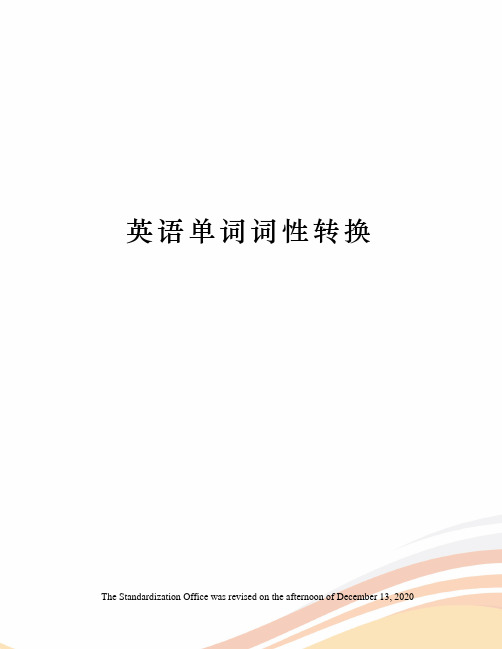
英语单词词性转换The Standardization Office was revised on the afternoon of December 13, 2020英语单词词性转换一、动词(v.)→名词(n.)1、词尾加上-er或-or之后就变成了表示"某一类人"的名词例如:work—worker, teach—teacher, sing—singer,jump—jumper, play—player, learn—learner,visit—visitor, invent—inventor,collect—collector等.注意:1)以不发音的e结尾的动词,在词尾加-r.例如:drive—driver, write—writer等.2)以辅音字母开头并以元音字母加辅音字母结尾的单词,应双写末尾的辅音字母再加er。
例如:run—runner, win—winner,begin—beginner 等.2.在动词词尾加上-ment 变成名词例如:achieve—achievement (成就)advertise—advertisement例如:argue—argument(争论)3.在动词词尾加上-(t)ion/(s)ion变成名词例如: attract—attraction; instruct—instruction;invent—invention discuss—discussion;express—expression educate—education;graduate—graduation; operate—operation (去e再加"ion")compete—competition; organize—organization (把e改成其他字母再加"tion")decide—decision conclude—conclusion (把de改为s再加"ion")describe—description描写,描绘 (这是特例,不规则变化)4.在动词词尾加上-ance变成名词例如: appear—appearance (外貌;出现)perform—performance (演出)accept—acceptance (接受)resist-resistance n.抵抗,阻力5.在动词词尾加-ing变成名词 (方法与动词变为现在分词的方法相同)例如:meet—meeting build—building wait—waitingbathe—bathing say—saying(谚语) mean—meaning注意:以辅音字母开头并以元音字母加辅音字母结尾的单词,应双写末尾的辅音字母再加-ing如:swim—swimming shop—shopping begin—beginning二、动词(v.)→形容词(adj.)1.动词后面加able,以e结尾的动词则去e加able,表示具有此性质,特点或属性.例如: afford-affordable;love-lovable2.动词后面加ed,以e结尾的动词则直接加d,表示被动性的属性或特点.例如: scatter-scattered use-used3不规则的动词则必须记忆,记住其过去分词形式.规律不大,意义同(b).三.名词(n.)→形容词(adj.)1.在名词后面加-y可以变成形容词(尤其是一些与天气有关的名词)例如: rain—rainy, cloud—cloudy, wind—windy, snow—snowy,health—healthy, luck—lucky,anger—angry guilt—guilty(内疚的)tourist—touristy(游客多的) , salt (盐)—salty (咸的)silk(丝绸)—silky(丝绸般的), sleep—sleepy (昏昏欲睡的)注意:1)如果以辅音字母开头并以元音字母加辅音字母结尾,这时应双写辅音字母再加"-y".如: sun—sunny, fun—funny, fog—foggy(有雾的), fur—furry(毛皮的)2)少数以不发音的e结尾的名词变为形容词时,应去掉e再加"-y".如: noise—noisy, ice—icy, shine—shiny(发亮的), taste(口味)—tasty(甜的)2.名词后面加-ed,以e结尾的直接加d.例如: spot(斑点)—spotted(有斑点的); talent—talented (有天赋的)organize—organized 有组织的; balance—balanced(平衡的)3.一些抽象名词在词尾加-ful可以变为形容词例如:care—careful, thank—thankful, help—helpful,use—useful, meaning—meaningful4.在名词后加-less构成含有否定意义的形容词例如:care—careless(粗心的), use—useless(无用的)hope—hopeless(没希望的),home—homeless(无家可归的)5.一些以-ce结尾的名词,把-ce改为-t变成形容词例如: difference—different, silence—silent, confidence—confident6.在名词后加-ly变为形容词例如: friend—friendly, love—lovely, live---lively7.在名词后加-ous变为形容词例如: danger—dangerous prosperous a 繁荣的(pro 在前+sper 希望+ous)8.名词后面加-al变为形容词例如: music—musical; medicine—medical (这个比较特殊)9名词后面加-able变为形容词,如果以e结尾就去e再加"-able".例如: adjust—adjustable 可调整的 value—valuable有价值的10.名词后面加-en变成形容词例如: wood—wooden 木制的 wool—woolen 羊毛的四.形容词(adj.)→副词(adv.)▲一般在形容词的词尾加-ly可以变成副词例如: quick—quickly, slow—slowly, loud—loudly, sudden—suddenly 等例如:possible—possibly, terrible—terribly。
英语单词词性转换规则
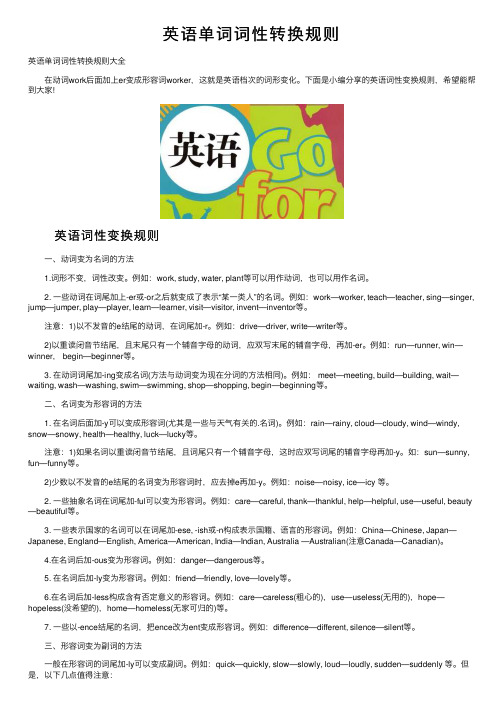
英语单词词性转换规则英语单词词性转换规则⼤全 在动词work后⾯加上er变成形容词worker,这就是英语档次的词形变化。
下⾯是⼩编分享的英语词性变换规则,希望能帮到⼤家! 英语词性变换规则 ⼀、动词变为名词的⽅法 1.词形不变,词性改变。
例如:work, study, water, plant等可以⽤作动词,也可以⽤作名词。
2. ⼀些动词在词尾加上-er或-or之后就变成了表⽰“某⼀类⼈”的名词。
例如:work—worker, teach—teacher, sing—singer, jump—jumper, play—player, learn—learner, visit—visitor, invent—inventor等。
注意:1)以不发⾳的e结尾的动词,在词尾加-r。
例如:drive—driver, write—writer等。
2)以重读闭⾳节结尾,且末尾只有⼀个辅⾳字母的动词,应双写末尾的辅⾳字母,再加-er。
例如:run—runner, win—winner, begin—beginner等。
3. 在动词词尾加-ing变成名词(⽅法与动词变为现在分词的⽅法相同)。
例如: meet—meeting, build—building, wait—waiting, wash—washing, swim—swimming, shop—shopping, begin—beginning等。
⼆、名词变为形容词的⽅法 1. 在名词后⾯加-y可以变成形容词(尤其是⼀些与天⽓有关的.名词)。
例如:rain—rainy, cloud—cloudy, wind—windy, snow—snowy, health—healthy, luck—lucky等。
注意:1)如果名词以重读闭⾳节结尾,且词尾只有⼀个辅⾳字母,这时应双写词尾的辅⾳字母再加-y。
如:sun—sunny, fun—funny等。
2)少数以不发⾳的e结尾的名词变为形容词时,应去掉e再加-y。
词性转换

在名词后面加-y可以变成形容词(尤其是一些与天气有关的名词)。
例如:1.rain—rainy, cloud—cloudy, wind—windy, snow—snowy, health—healthy, luck—luckysun—sunny, fun—funny noise—noisy, ice—icy 等。
2. 一些抽象名词在词尾加-ful可以变为形容词。
例如:care—careful, thank—thankful, help—helpful, use—useful, beauty—beautiful等。
3. 一些表示国家的名词可以在词尾加-ese, -ish或-n构成表示国籍、语言的形容词。
例如:China—Chinese, Japan—Japanese, England—English, America—American, India—Indian, Australia —Australian(注意Canada—Canadian)。
4.在名词后加-ous变为形容词。
例如:danger—dangerous等。
5. 在名词后加-ly变为形容词。
例如:friend—friendly, love—lovely等。
6.在名词后加-less构成含有否定意义的形容词。
例如:care—careless(粗心的),use—useless(无用的),hope—hopeless(没希望的),home—homeless(无家可归的)等。
7. 一些以-ence结尾的名词,把ence改为ent变成形容词。
例如:difference—different silent-silence二、动词变为名词的方法1.词形不变,词性改变。
例如:work, study, water, plant等可以用作动词,也可以用作名词。
2. 一些动词在词尾加上-er或-or之后就变成了表示“某一类人”的名词。
例如:work—worker, teach—teacher, sing—singer, jump—jumper, play—player, learn—learner, visit—visitor, invent—inventor drive—driver, write—writer run—runner, win—winner,begin—beginner等。
英语词性转换的技巧
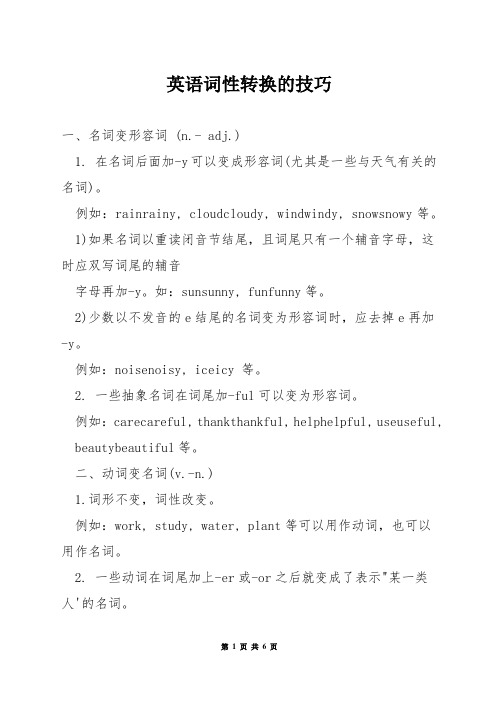
英语词性转换的技巧一、名词变形容词 (n.- adj.)1. 在名词后面加-y可以变成形容词(尤其是一些与天气有关的名词)。
例如:rainrainy, cloudcloudy, windwindy, snowsnowy等。
1)如果名词以重读闭音节结尾,且词尾只有一个辅音字母,这时应双写词尾的辅音字母再加-y。
如:sunsunny, funfunny等。
2)少数以不发音的e结尾的名词变为形容词时,应去掉e再加-y。
例如:noisenoisy, iceicy 等。
2. 一些抽象名词在词尾加-ful可以变为形容词。
例如:carecareful, thankthankful, helphelpful, useuseful, beautybeautiful等。
二、动词变名词(v.-n.)1.词形不变,词性改变。
例如:work, study, water, plant等可以用作动词,也可以用作名词。
2. 一些动词在词尾加上-er或-or之后就变成了表示"某一类人'的名词。
例如:workworker, teachteacher, singsinger, jumpjumper, playplayer,learnlearner, visitvisitor, inventinventor等。
2学好英语的小窍门学习英语是随时随地的比如说买了一件新东西我都会对上面的包装或说明书仔细研究一番,当然不是在研究商品本身,是为了看上面的英语解释,想多几个地道的英语表达而已。
买了一瓶止咳露,从上面也学到不少东西。
比如说,有效期可以说成validity,规格可以说成specification,贮藏可以说成 storage,放在儿童接触的地方可以这样说keep out of the reach of children,等等等等。
这些东西都非常有用,虽然有时你看了一遍不一定记得,但当你下次再碰到它们的时候你的印象就会更加深入,久而久之便会记得。
- 1、下载文档前请自行甄别文档内容的完整性,平台不提供额外的编辑、内容补充、找答案等附加服务。
- 2、"仅部分预览"的文档,不可在线预览部分如存在完整性等问题,可反馈申请退款(可完整预览的文档不适用该条件!)。
- 3、如文档侵犯您的权益,请联系客服反馈,我们会尽快为您处理(人工客服工作时间:9:00-18:30)。
词性转换1.absence n. absent a.2.add v. addition n. additional a.3.agriculture n. agricultural a.4.able a. enable v. disable a. 残疾的ability n.5.amaze v. 使吃惊amazing a. amazement n.6.advise v. advice n.7.art n. artist n8.act v. actor actress action activity n. active a.actors actresses activities (pl.)actual a. (实际的) actually ad.9. apologize v. apology n.10. attend v. attentive adj. attentively adv. attention n .11. America n. American a.12. Australia n. Australian ( n. a.)13. Africa n. African a.14. alive a. live v. lively a. living a. life n.15. asleep a. sleepy a. sleep (v, n.) sleepless a.失眠的不眠的16. allow v. allowable a. allowance n. (津贴)17. announce v. announcement announcer n.18. Asia n. Asian a.19. attend v. attentive a. attention n. attentively ad.聚精会神地20. attract v.吸引attractive a. attraction n. (区别attack 进攻)21. achieve v. 得到achievement n. achievable a.22. auto v. automatic a. automatically ad.23. arrive v. arrival n.24. appear v. disappear v. (dis)appearance n.25. advertise v. advertisement n.26. amuse v. amusement 娱乐n. amusing a.27. argue v. argument n.28. anger n. angry a. angrily ad.29. ambition n. ambitious a.30. (dis) agree v. agreement n.31. arrange v. arrangement n.32. age n. aged adj.33. awful a. awfully adv.34. accept v. acceptable a.可以接受的accepted a.公认的acceptance n.35. adopt v. adoption n. adopted a. adoption n.36. advantage n. disadvantage n.37. agent n. agency n.38. assist v. assistant n.39. available a. availability n.40. bank n. banker n.41. begin v. beginner beginning n.42. busy a. busily ad. business n.43. bore v. bored boring a.bear v. bore born44. build v. rebuild v. builder building n.45. break v. broken a.46. beauty n. beautiful a. beautifully ad.47. base n. basic a. basement n.48. beg v. beggar n.49. brave a. bravely ad. bravery n.50. breathe v. breath n.51. Britain n. British a.52. bright a. brightly ad. brightness n.53. buy v. buyer n.54. believe v. believable a55. bad a. badly ad. ( worse worst )56. cross v. across (prep.) crossing n.57. calculate v. calculator n. calculation n. calculating a.58. certain a. certainly ad.59. care (v. n.) careful a. carefully ad. carefulness n. careless a. carelessly ad. carelessness n.60. custom n. customer n.61. culture n. cultural a.62. choose v. choice n.63. cook (n. v.) cooker n. (炉灶) cooking n.64. chemistry n. chemical (n. a.) chemist n65. Canada n. Canadian a.66. cycle v. cyclist n. recycle v.67. crowd (n. v.) crowded a.68. celebrate v. celebration n.69. change (n. v.) changeable a.70. colo(u)r n. colo(u)rful a. colo(u)rless a.71. collect v. collection n.72. correct (v. a.) correctly ad. (un)corrected a.(未)改正过的incorrect a. (不正确的)73. cloud a. cloudy ad.74. comfortable a. ( un)comfortable a. comfortably ad.75. complete (a. v.) incomplete a. ( 不完整的)completely ad. uncompleted a, (未完成的)76. convenient a. inconvenient a. convenience n. conveniently ad.77. craze n. crazy a. crazily ad.78. create v. creation n. creative a. creator n. recreate v.再创79. congratulate v. congratulation n.80. cover (n. v.) covering n.(覆盖物) coverage n.(覆盖率)recover v. 恢复康复discover v. discovery n.81. consume v. consumer n. (消费者)82. complain v. complaint n. 抱怨83. count v. (un) countable a. countless a. (数不尽的)84. child n. children n. childhood n.85. cheer v. cheerful cheerless a. (惨淡的) cheerfully ad.86. city n. citizen n.87. compete v. competition n.88. conclude v. conclusion n.89. continue v. continuous a. continuously ad.confident a. confidence n.90. dark a. darken v. darkness n.91. develop v. development n. developed developing a.92. discuss v. discussion n.93. die v. dead a. deadly a. dying a. death n.94. decide v. decision n.95. different a. difference n.96. deep a. deeply ad. deepen v. depth n.97. difficult a. difficulty n. (困难)98. design v. designer n.99. danger n. dangerous a.100. describe v. description n.101. draw v. drawing drawer n.102. drive v. driver n.103. day n. daily n.104. debate n. debater n.105. decorate v. decoration n.106. deliver v. delivery n.107. (in)depend v. (in)dependent a. (in)dependence n.108. depart v. departure n.109. (dis)honest a. (dis)honesty n.110. enter v. entrance n. entry n. (进入)energy n. energetic a. energetically ad.111. engine n. engineer n.112. electricity n. electric light ; electrical engineer ; a.113. expense(s) n. expensive a.114. Europe n. European (a. n.) a European country115. easy a. easily ad.116. effect n. affect v. (影响) effective a.117. education n. educational a. educate v. educated a. educator n. 118. explain v. explanation n.119. excite v. excited a. exciting a.excitedly ad. excitingly ad. excitement n.120. examine v. exam examination n.121. encourage v. courage n.122. exist v. existence n.economy n. economic a.123. exact a. exactly ad.124. elect v. election n.125. environment n. environmental a.126. edit v. editor n. edition n.127. enjoy v. enjoyful enjoyable a.128. element n. elementary a.129. especial a. especially ad.130. excellent a. excellence n.131. explore v. explorer n. exploration n.132. free v. a. freely ad. freedom n.133. fly v. flyer flight fly (苍蝇pl. flies)134. final a. finally ad.135. forget v. forgetful a. unforgettable a.136. friend n. (un) friendly a. friendship n. 137. fool n., v. foolish a.138. fame n. famous a.139. foreign n. foreigner n.140. freeze v. freezing weather; frozen food;141. fun n. funny a.142. France n. French a. Frenchman Frenchmen 143. faint a. ( 微弱的) faintly ad.144. frighten v. frightened frightening a.145. fact n. factor n.146. fail v. failure n.147. favour n. favourite a.148. fight v. fighter n.149. fire n. fireman n. firework n.150. fish n. fisherman n.151. follow v. following n.152. fun n. funny a.153. general a. generally ad.154. grow v. growth n.155. gold n. golden a.156. graduate v. n. graduation n.157. greed n. greedy a. greedily ad.158. Germany n. (德国) German (a. n.) Germans pl.159. garden n. gardener n.160. gentle a. gently ad.161. gold n. golden a.162. govern v. government n. governor n.163. grow v. growth n.164. (un)happy a. (un) happily ad. happiness n.165. help (v. n.) helpful helpless a. helpfully ad. helper n. 166. history n. historical a.167. hungry a. hunger n. hungrily ad.168. heavy a. heavily ad.169. high a. height n.170. hesitate v. hesitation n.171. health n. (un)healthy a.172. hurry (n. v.) hurried a. hurriedly ad.173. hot a. hotter hottest a. heat (n. v.) heater n. 174. home n. ad. homeless a.175. harm n. v. harmful ;harmless ad.176. host n. v. hostess n.177. hard a. & ad. hardly ad. 几乎不178. head n. headache n. headmaster headmistress n. 179. hope v.& n. hopeful a. hopeless a.180. humour n. humourful a.181. ill a. illness n. ill/bad/badly---worse worst 182. important a. importance n.183. invite v. invitation n.184. interest v. n. interested; interesting a.185. introduce v. introduction n. introducer n.186. invent v. invention inventor n.187. inform v. information n.188. individual a. individually ad.189. immediate a. immediately ad.190. India n. Indian a. n.191. Italy n. Italian a.192. (im)possible a. (im)possibly ad.193. improve v. improvement n. improver n.194. increase v. decrease v.195.joy n . joyful a. enjoy v. enjoyable a. 196. Japan n. Japanese a. & n.197. know v. knowledge n. unknown a.198. keep v. keeper n.199. kind a. kindly ad. kindness n.200. kill v. killer n.201. key n. keyboard n.202. library n. librarian n.203. long a. length n.204. luck n. (un)lucky a. (un)luckily ad.205. law n. lawful ; lawless a. lawyer n. 206. loud a. loudly ad.207. locate v. located a. location n.208. lose v. lost a.209. listen v. listener n.210. love v. lovely a.211. live v. living /alive /lively a. life n. living n.lifeless a.212. lead (led led) v. leader n. leadership n.213. late a.&ad. lately ad.=recently214. love v.&n. lovely a.215. mean v. meaning n. meaningful a,216. medicine n. medical a.217. manage v. manager n. management n.218. main a. mainly ad.219. music n. musical n. a. musician n.220. month n. monthly a. ad.221. memorize v. memory n.222. mix v. mixture n.223. message n. messenger n.224. move v. movement n. moving a. moved a.225. near prep. /adj. nearby adj. nearly adv.226. nature n. natural a. naturally ad.227. noise n. noisy a. noisily ad.228. neighbo(u)r n. neighbo(u)rhood n.229. need v. n. (un) necessary a. necessity n.230. nation n. national a. nationality n. native a.&n. 231. own v. owner n.232. operate v. operation n. operator n.233. organize v. organization n. organizer n.234. office n. officer n. official a.235. observe v. observer n. observing a.old a. elder/older elderly a.one num. first once firstly236. occupation n. occupational a.237. polite a. politely ad. (im)polite(ly)238. pass v. passer n. passenger n.past prep. passport n.240. please v. pleased ; pleasant a. pleasure n.241. proud a. proudly ad. pride n.242. patient a. (im)patient a. patiently ad. patience n. 243. power n. powerful powerless a. powerfully ad.244. post v. n. postage n. postal a.245. possible a. (im)possible a. (im)possibly ad.246. professor n. professional a. profession n.247. piano n. pianist n.248. protect v. protective a. protection protector n.249. physics n. physical a.250. prefer v. preferred preference n.251. paint v. painter n.; painting n.; (un)painted a. 252. plastic a. plastics n.253. practise v. practice n.254. perform v. performance n.255. peace n. peaceful a. peacefully ad.256. perform v. performance n257. pollute v. pollution n.258. pronounce n. pronunciation n.259. quiet a. quietly ad.260. quick a. quickly ad.261.262. rob v. robber robbery n.263. recite v. recitation n.264. report v. n. reporter n.265. real a. really ad.266. rain v. n. rainy a.267. record n. v. recorder n.268. receive v. receiver n.reception receptionist n.269. realize v. realization n.270. relax v. relaxation n.271. recent a. recently ad.272. review v. revision n.273. read v. reader n. reading n.274. response n. responsible a. responsibility n.275. Russia n. Russian a. n.276. spell v. spelling n.277. sad a. sadder (more) sadly ad.278. save v. safe a. safely ad.safer more safelysafety n. saving(s) n.(积蓄)279. serve v. service n. servant n.280. sick a. sickness n.281. simple a. simply ad.282. solve v. solution n.283. strange a. stranger n. strangely ad.284. serious a. seriously ad.285. smoke v. n. smoking n. smoker n.smoked a. (烟熏的)286. speak v. speaker n. speech n.287. sudden a. suddenly ad.288. straight a. ad. straightly ad.289. situation n. situational a.290. surprise n. v. surprised surprising a.291. science n. scientist n. scientific a.292. succeed v. successful a. successfully ad. success n. 293. Singapore n. Singaporean (a. ;n.)294. silent a. silence n. silently ad.295. swim v. swimmer n. swimming n.296. suggest v. suggestion n.297. sell v. sale n. seller n.298. say v. saying (proverb) n.299. sense n. sensible a.300. secret a. n. secretary n. secretly ad. 301. second ( n. a. ad. ) secondary a. secondly ad.302. sleep n. v. be/fall asleep a. be/feel sleepy a. 303. steam n. v. steamed a. steamer n.304. spell v. spelling n.305. solve v. solution n.306. satisify v. satisified a.307. short a. shorten v.308. sight n. sightseeing n.309. soft a. softly ad.310. true a. truly ad. ; truth n.311. thank v. thankful a. ; thanks n.312. tradition n. traditional a. ; traditionally ad. 313. think n. thinker n. thought n.、314. temper n. temperature n.315. terrible a. terribly ad.316. tradition n. traditional a. traditionally ad.317. translate v. translated a. translation n.318. use v. n. useful useless a. usage n. 319. usual a. usually ad.(un)usual a. (un)usually ad.320. view n. review v. viewer n.321. visit n. v. visitor n.322. village n. villager n.323. value n. valuable (有价值的) valueless (无价值) a. 324. vary v. various a. variously ad.325. wait v. waiter ; waitress n.326. warm v. a. ; warmth n. ; warmly adv.327. wake(woke waken ) v. awake a.328. east n.a. eastern a. ; south n. southern a.west n. a. western a.; north n. northern a. 329. win v. winner n.330. weigh v. weight n. weighed v.weigh the parcel; (v.) the weight of the parcel ; (n)The bag weighs 5 kilos. (vi)331. wild a. wildness n. 荒地荒野wildly ad. 332. wide ad./ a. widely ad. ; widen v. width n. 333. win v. winner n.334. wise a. wisely ad. ; wisdom n.335. wound n. v. wounded a.336. wool n. woollen (US woolen) a.337. wood n. wooden a.338. worry n. worried a. worriedly adv. 339. wonder n. v. wonderful a. wonderfully ad. 340. wind windy ; rain rainy ; cloud cloudy ; 341. sun n. sunny a.342. zero (pl.) zeros photo(s) radio(s)tomato(es) hero(es) potato(es)。
